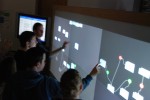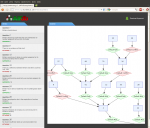
Last night the ARG:dundee team conducted close argument analysis on a live 45 minute broadcast of an episode of the BBC Radio 4 programme, The Moral Maze, using our Argument AnalysisWall.
We aimed to make debates available on the Argument Web for all the different compatible online tools to access. Specifically, we wanted to analyse broadcast debate and support online interaction with those arguments. Live. To do it, we needed lots of analysts working together, using a large touch screen running bespoke software to collaboratively analyse the discourse. Stenographic transcription, argument segmentation and enthymeme reconstruction are all carried out by other team members. There are more details and a short video of the result is available and an unedited single-camera view of the full 45 minutes is also available. A more interesting, multi-camera version of the full analysis is also available.








